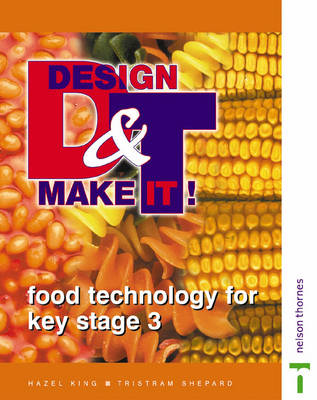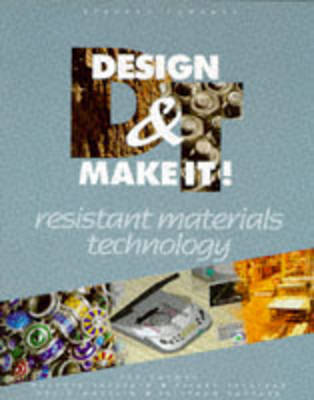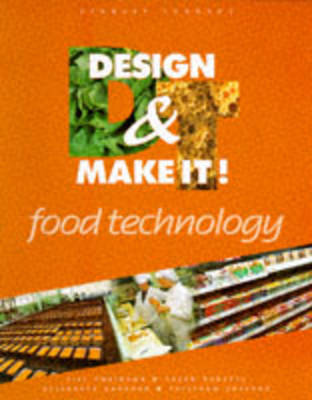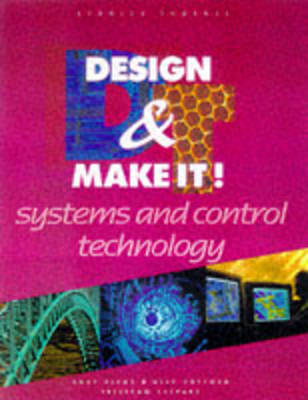Design & Make It! S.
6 total works
Pupil's become familiar with the project-based approach, where knowledge and understanding are enhanced by on-going tasks. Emphasis is placed upon encouraging pupils to provide appropriate assessment evidence, enabling them to produce a coherent folder of work demonstrating their designing and making skills. Industrial case studies help introduce pupils to manufacturing terminology and concepts needed at GCSE. The pupil's book has been created to minimise the amount of text, making it readable for the age group and providing a high level of visual stimulus. This attracts pupils' attention, helps to stimulate and retain their interest and promotes action to assist their understanding and recall of information.
Resistant Materials Technology
by Ted Cosway, Melanie Fasciato, Hilary Felstead, David Macklin, and Tristram Shepard
Published 7 February 1997
Integrates coverage of the appropriate knowledge and understanding into a helpful, easy to follow project structure for coursework and written test papers.Four project areas: design of a timepiece; jewellery design; wooden toys for children; DIY furniture.Extensive case study material supported by the Channel 4 Video.Written-paper key point summaries and sample test questions.
Electronic Products
by Dave Mawson, Paul Bell, Philip Poole, and Tristram Shepard
Published December 1996
Designed to provide direct support for the revised GCSE Key Stage 4 Technology syllabuses, this series has been prepared by a team of NEAB examiners. Each book contains a mixture of extended projects, tasks and activities, together with written-paper key points and sample questions. Coverage of appropriate knowledge and understanding is integrated into a project structure, so that pupils prepare themselves for the written paper as they tackle the coursework. Alternatively, sections of the books can be used as a general resource to support any project. The linked television series emphasises industrial design and manufacturing practices, the application of systems and control, and the use of IT. Each programme is intended as a general introduction to these aspects of the National Curriculum within the context of the examination syllabus. After an introductory project guide, providing prompts and checklists to ensure coverage of the investigation, development, testing, evaluation and presentation of design proposals, this book offers four projects for electronic products.
The first involves designing and making a digital lock, the second an electronic timing device for use in a dentist's surgery, the third an alarm for a production company, and the fourth an electronic toy or game for a young child.
The first involves designing and making a digital lock, the second an electronic timing device for use in a dentist's surgery, the third an alarm for a production company, and the fourth an electronic toy or game for a young child.
Designed to provide direct support for the revised GCSE Key Stage 4 Technology syllabuses, this series has been prepared by a team of NEAB examiners. Each book contains a mixture of extended projects, tasks and activities, together with written-paper key points and sample questions. Coverage of appropriate knowledge and understanding is integrated into a project structure, so that pupils prepare themselves for the written paper as they tackle the coursework. Alternatively, sections of the books can be used as a general resource to support any project. The linked television series emphasises industrial design and manufacturing practices, the application of systems and control, and the use of IT. Each programme is intended as a general introduction to these aspects of the National Curriculum within the context of the examination syllabus. After an introductory project guide, providing prompts and checklists to ensure coverage of the investigation, development, testing, evaluation and presentation of design proposals, this book offers four projects for graphic products.
The first concerns the poster and merchandising for a new film, the second an environmentally-friendly package for a high-street stationery shop, the third the casing and graphics for an electronic pager, and the fourth the promotion and launch of a new range of sports accessories.
The first concerns the poster and merchandising for a new film, the second an environmentally-friendly package for a high-street stationery shop, the third the casing and graphics for an electronic pager, and the fourth the promotion and launch of a new range of sports accessories.
Food Technology
by Jill Robinson, Elizabeth Barnard, Helen Roberts, and Tristram Shepard
Published March 1997
Designed to provide direct support for the revised GCSE Key Stage 4 Technology syllabuses, this series has been prepared by a team of NEAB examiners. Each book contains a mixture of extended projects, tasks and activities, together with written-paper key points and sample questions. Coverage of appropriate knowledge and understanding is integrated into a project structure, so that pupils prepare themselves for the written paper as they tackle the coursework. Alternatively, sections of the books can be used as a general resource to support any project. The linked television series emphasises industrial design and manufacturing practices, the application of systems and control, and the use of IT. Each programme is intended as a general introduction to these aspects of the National Curriculum within the context of the examination syllabus. This book is based on three units of work, divided into a series of activity-based food-technology topics. The first unit includes coverage of topics such as the evaluation of chilled products, the second deals with baked products, and the theme of the third is eating out.
The units are followed by a project guide, providing prompts and checklists to ensure coverage of the investigation, development, testing, evaluation and presentation of design proposals.
The units are followed by a project guide, providing prompts and checklists to ensure coverage of the investigation, development, testing, evaluation and presentation of design proposals.
Systems and Control Technology
by Andy Biggs, etc., Hoffman, and Tristram Shepard
Published 3 July 1998
Covering the National Curriculum core requirements of GCSE Design and Technology syllabuses, this book presents project-based activities on two themes: "The Smart Hotel" and "A Testing Time". They incorporate microprocessor control, pneumatics, electronics, structures and mechanisms. Prompts and check-lists are provided, together with five industrial case studies, project ideas for final GCSE course-work submissions, and sample examination question papers prepared by NEAB examiners.




